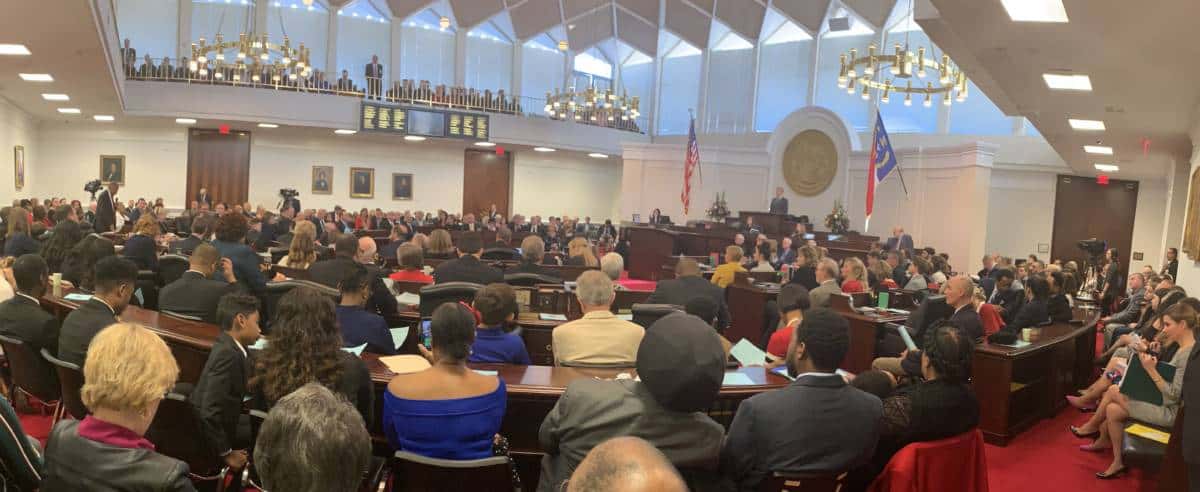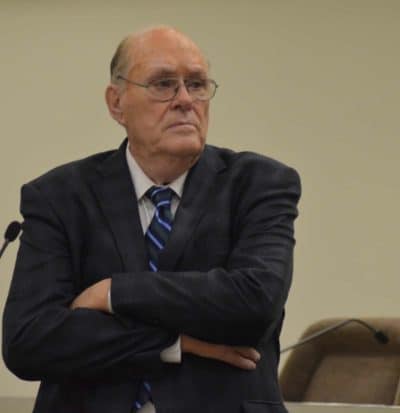Update 10:40 — May 31, 2019: The Senate budget passed its third and final vote this morning.
The North Carolina 2019-21 Senate budget passed its second reading 29-18 today despite strong opposition from Senate Democrats. After it passes its third reading tomorrow, the House and Senate will negotiate over their competing spending plans before sending it on to Gov. Roy Cooper for his signature or a veto.
Senate Democrats did a round-robin of criticism on the Senate floor, with Sen. Jay Chaudhuri, D-Wake, calling on other Democrats to discuss different portions of the budget. Chaudhuri himself called out the budget for not investing adequately in the state.
“North Carolina is a growing state. Right now, we are adding 110,000 new residents every year,” he said. “If we don’t make smart investments in our people and our growing state, we will continue to fall behind.”
When called on, Sen. Floyd McKissick, D-Durham, criticized the “siphoning” of money to tax cuts and the fact that the Senate budget leaves money unspent.
“We rank in North Carolina tops in terms of our business climate, but we’re in the bottom quarter of what we’re spending per pupil,” he said.
The Senate budget leaves more than $700 million unspent in the first year of the biennium and more than $200 million unspent in the second year. The House also leaves money unspent in its budget plan: more than $600 million in the first year of the biennium and more than $400 million unspent in the second.
The headline for education in the Senate budget was its 3.5 percent pay raises for teachers over two years, with bonuses for more veteran teachers. The relatively small raises for teachers were the result, Senate lawmakers said, of their attempt to pay more attention to other government workers in this budget.
For more details on the Senate budget plan, go here.
Chaudhuri called on Sen. Wiley Nickel, D-Wake, to talk specifically about the budget’s shortcomings on education.
Nickel called out early childhood education and teacher salaries in particular.
“Over the past 10 years, funding for critical early childhood programs have been systematically cut,” Nickel said.
He went on to explain that funding for the early childhood education program Smart Start was $210 million in 2008 and only $150 million in 2018. He noted that in Gov. Cooper’s budget, the Governor proposed a $20 million increase to the program while the Senate only offers a $2 million increase. He ended by saying that the budget “clearly doesn’t value public education or student success.”
On teacher salaries, Nickel called the pay raises “meager” and said “there is no excuse” for them. He then referenced the teacher march on Raleigh from earlier this month, when teachers demonstrated with a list of demands for lawmakers including higher pay.
“Thousands of teachers marched to the legislature demanding change. … Those who drafted this budget were clearly not listening,” Nickel said.
While a number of amendments were considered during the Senate floor debate, there were no significant changes to the education portion of the budget.
Sen. Kirk Deviere, D-Cumberland, put forward an amendment that would restore Master’s pay for teachers. This pay, which allows teachers with advanced degrees to receive extra salary, was eliminated in 2013 by the General Assembly, and Deviere said lawmakers have been trying to restore it ever since — including in a bipartisan bill this session.
“Our teachers deserve this type of salary increase,” he said. “They earned it. It should have never been taken away.”
The amendment was “tabled,” essentially killing it without an up or down vote. The House budget proposal includes the restoration of Master’s pay.
Senate Democratic leader Dan Blue, D-Wake, closed out the criticism on the budget just prior to the vote. He said the state is too close to the bottom in some national rankings, including per-pupil funding, and that the General Assembly must shift its priorities.
“Our great needs are not in the corporate boardrooms,” he said. “They’re in our communities and in our classrooms.”
Just after him, Senate President Pro Tempore Phil Berger, R-Rockingham, had the final word.
“Sometimes it’s easier to be against something than it is to be for something … if you look at what we have here, this budget, on balance, is one of the best budgets that we’ve passed here in the Senate,” he said.
Gov. Cooper weighed in on the Senate budget via a press release from his spokesperson Ford Porter during the debate.
“With their budget, Senate Republicans once again prioritize more corporate tax cuts at the expense of public education, clean water and providing affordable health care for hard working North Carolinians,” the statement said. “These are unacceptable priorities and Governor Cooper will continue pushing for a budget that represents middle class families instead of special interests and corporate shareholders.”



